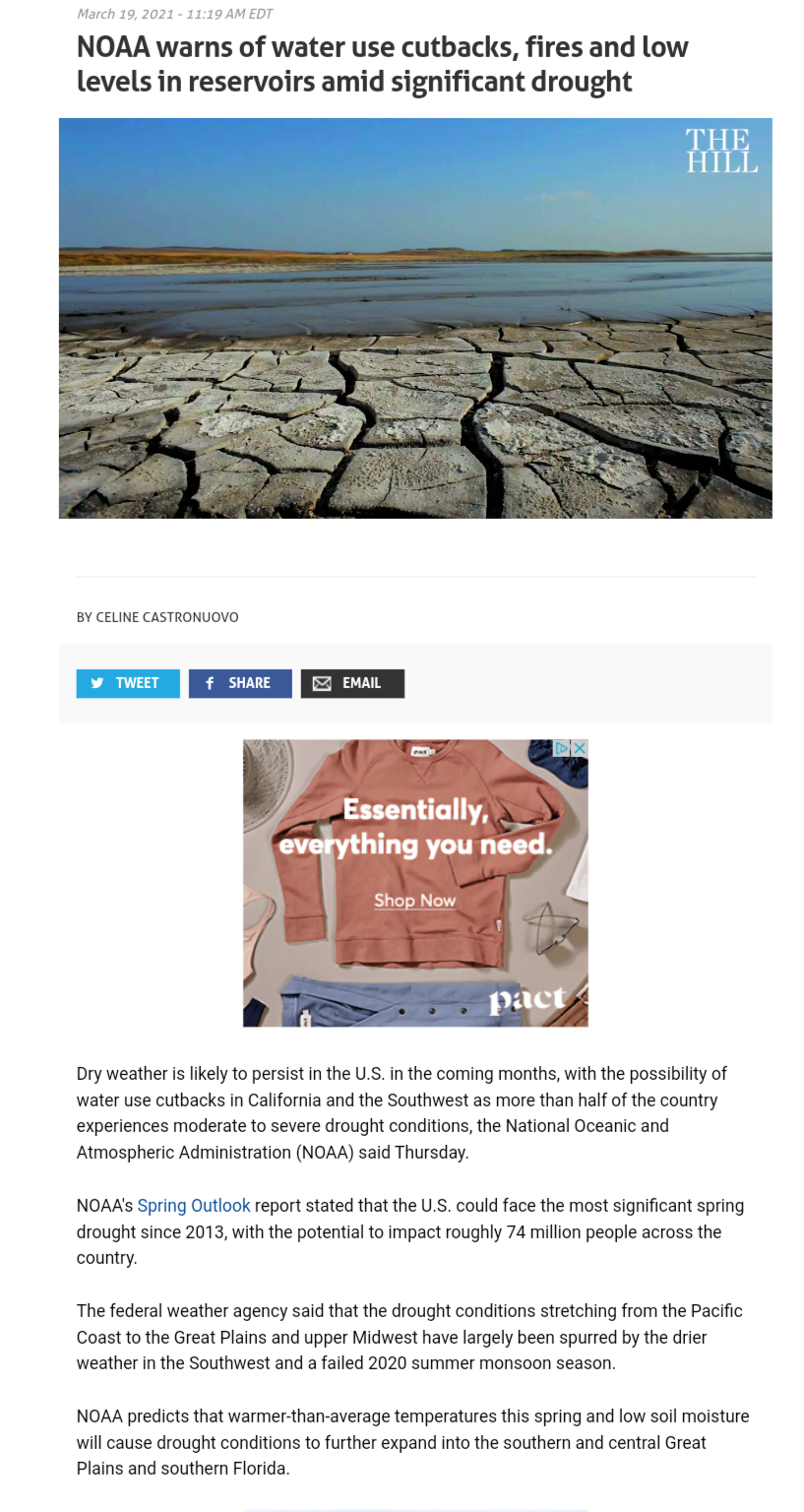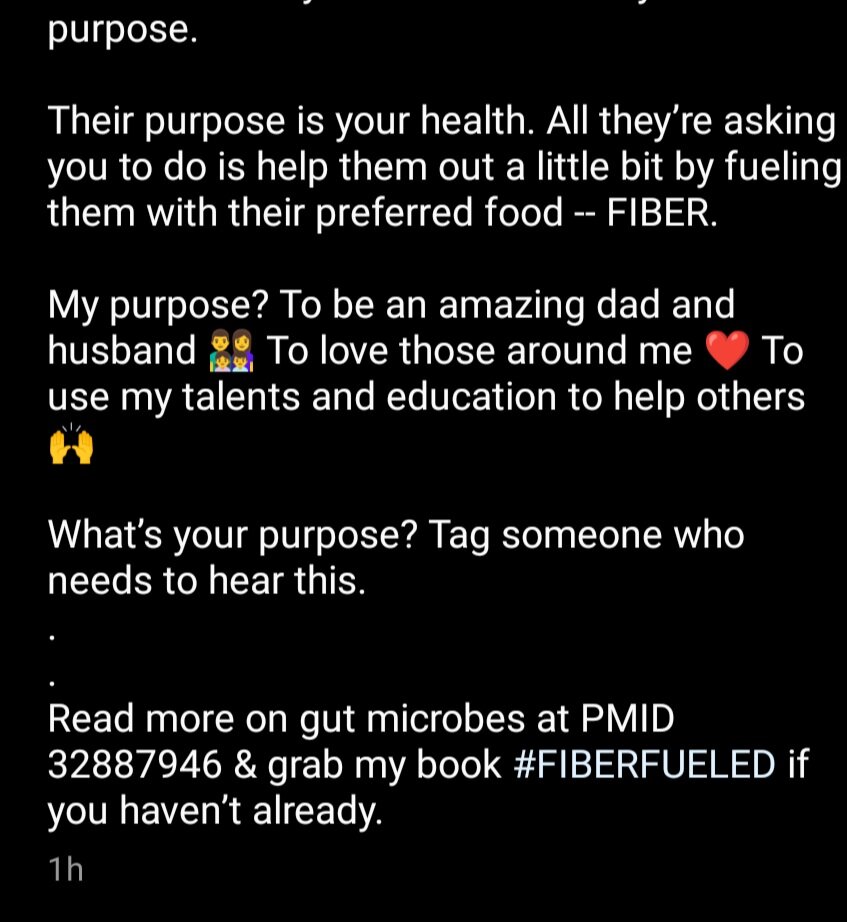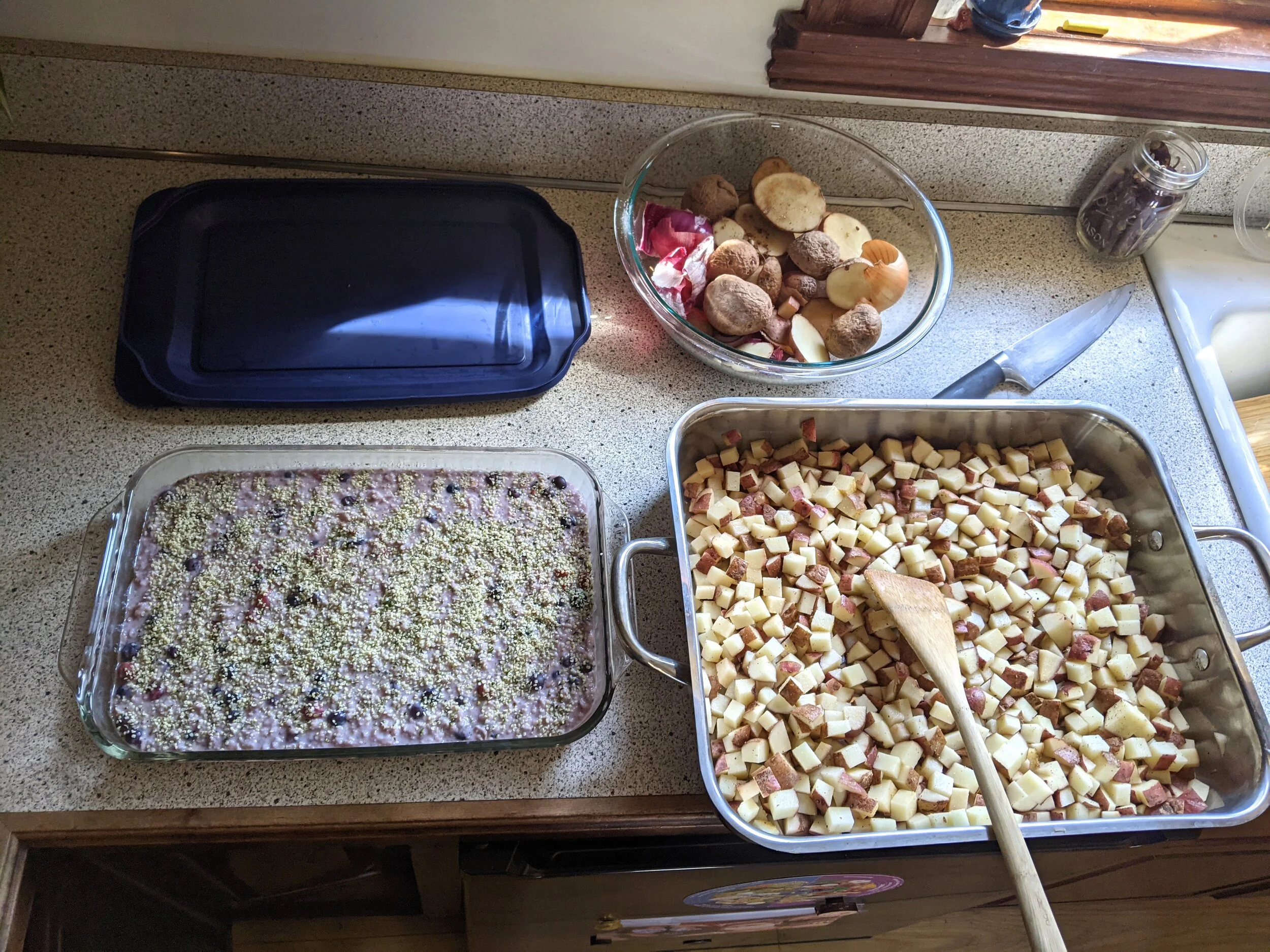Seasonal Growth & Spring Splashing with Drought Articles Jangling Around in the Mental Background
A decade ago (and the decade before that, and the decade before that), my weeks were fraught with daily anxiety attacks and my meals were mostly a vegetable-less/green-less combo of refined-carb (likely fried or slathered in enough oil that it might as well have been) and any manner of animal-product, forever followed by a refined-sugar dessert… and capped with a soda for the earlier years and some manner of alcohol during the latter part.
If you’d said to me during any of those decades that I’d be merrily devouring a completely plant-based (mostly) whole-food diet, I would have promptly described just how gross I thought vegetables were and defended cheese/ribs/alcohol/chicken wings with every Scorpio sting I could muster. If you told the person who was eating Sour Patch Kids and Cherry Heads **as meals**, that it’s been so many years I can’t even fathom the horror, I would have mentally growled at you while I was scrapping out the last little sugary specks in their packaging (and Oh how I wish I knew then, what I do now about refined sugar and mental health).
The list goes on.
It started with Ian in college asking me to eat a few more vegetables so I’d “live long enough to grow old with him” and me eventually realizing I was an environmental hypocrite with my son’s sustainability hinging in the balance of my apathy, and now we’ve been revolving around the sun together for 16 years and somehow this past Junkfood Hobbit has a life’s purpose of howling out the power of plant-based diets (<—as is also harked by The United Nations and The World Health Organization) in the hope we avoid climate tipping points, prevent cardiovascular disease in our children (<—and reverse the damage done to us adults from our Standard American fare), prevent even more devastating species loss, prevent the ocean from acidifying beyond repair, and save a soul from suffering while we’re at it.
No one knows better than me just how delicious that stuff can be, but I’m also the the soul who woke up to the deleterious impacts (and all the ways we can heal that damage!), and thus I’m also here to say: the plant-based realm causes the same amount of food-joy, and it comes with environmental, healthful, and compassionate benefits.
What a positive (inexpensive) way to heal in multiple vectors, eh?
Continue for: fresh reading this week (covering cardiovascular disease, environmental policy re animal agriculture, droughts in America and Europe, the microbiome, and Blue Zones again); Ian’s superhuman LDL levels; examples of what this plant-based family-of-three was eating this week (<— the diet that lowers your environmental impact **70-80%**!!); and some Central New York living.
Live Kindly, Feast Kindly, Grow Forward.
Another snippet of from “How Not To Die” (Dr Michael Greger) that should empower you to grow-forward knowing your genes aren’t the sole player in your health destiny. Reducing the needs for medications due to Lifestyle Changes isn’t new or by any means unheard of: it’s the aim. If the literature, research, documentaries, and doctors harking the same doesn’t convince you, we have plenty of personal anecdotes to share. :-)
Here’s a few: Both Ian and I come from long lines of devastating cardiovascular disease and on my end there is a swirl of autoimmune diseases and depression/anxiety thrown in for good measure; yet we are on zero-medications, and have no need to be because (as you’re going to see below) we feed our microbiome fiber all the livelong day (not harmful bacteria that blocks our arteries and produces TMAO) and as such my mental health is better than ever, Quillan overcame his failure-to-thrive and hasn’t been sick since 2 Christmases ago (<—perpetuated by getting some accidental cheese at a school party), and Ian was once reveling in a heart-harming Keto diet but now has a LDL of ***54***.
Speaking of cholesterol: you should follow Plant Centered Prep on Instagram or through Ashely Kitchen’s (MPH, RD, LPN) site. What I love about her is that she is enthusiastically informative, down-to-earth, encouraging, and you’ll see examples of daily meals, exercises, and even get tips on mental health and behavioral change. Here is a post that reflected exactly what the doctors above had preached/seen/researched/seen again/proven.
The above slaps my heart and brain around every dang time I read it.
I’ll howl it again, again, and again, all day, every day: CARDIOVASCULAR DISEASE STARTS IN CHILDHOOD and now that we know this horrifying fact (and know that shifting to Plant-Based foods could not only prevent cardiovascular disease in our children, but also make their environment sustainable...while even sparing a soul from suffering to boot🙌❤️) it behooves us to move forward with this knowledge before it is too late🙏🙏 We've got climate tipping points hinging on the breadth of humanity's ability to wake up to this fact 😵💫🤦♀️
Want to move away from our Standard American Diet and the diseases it perpetuates? (If the planetary perils weren’t enough of a pull?)
I’ll redirect you to this horrifying/illuminating video again (and again, and again <—it’s showing how cardiovascular disease starts in children), and the following studies that show the same thing:
“Evidence of the Beginning of Atherosclerosis in Infancy and Adolescence”
“Cardiovascular disease risk factors and atherosclerosis in children and adolescents
“A Few Unpleasant Facts About Atherosclerotic Arterial Disease in the United States and the World”
See below: we already have The United Nations and The World Health Organization (among many other leading organizations) harking for you to transition as plant-based as possible for best personal and planetary health, and they’ve been doing it for YEARS, yet we have folks still saying ”That’s just your opinion…”, “Someday, someday…”, or “Never ever! Nope!” while we have increased droughts (<—only expected to get worse) and climate tipping points looming/approaching as swiftly (or faster) than our scientists have warned.
Wake up, wake up, wake up, please.
Humanity has the ability to use our big ol’ brains and do some serious fixing before it is too late, and the upside is that we better our health and spread compassion. What a win-win wake-up win.
And we’re not just talking about Planetary health and sustainability. Feeding your body more plants gives it more fiber, and that feeds your microbiome which is involved in all areas of your body’s health.
Here’s gastroenterologist Dr Will Bulsiewicz again:
I’ve written about Blue Zones a few times, but here’s a refresher:
What the heck are Blue Zones?
The Blue Zones are 5 populations which have been studied in detail by medical researchers, anthropologists, epidemiologists and demographers & show the greatest longevity across all human populations on Planet Earth. On average, they live 10 years longer than the average Westerner and their populations have 10x as many centurions (people 100+ yrs of age). These populations are from:
Okinawa, Japan
The Ogliastra region of Sardinia
karia, Greece
Nicoya, Costa Rica
Loma Linda, California
Ok, so what do they have in common?
“They eat a largely plant-based diet with the majority of their calories coming from grains, nuts, legumes, fruits & vegetables. Fava beans, black beans, soy beans and lentils are the most common lentils among the centenarians in these groups and are typically consumed daily. Fish and VERY small amounts of cheese (from sheep and goats, not from cows) are the most common animal products these populations consume. On average, 95% of their meals do not include any meat – to quantify this, that is 1 in 20 meals. They consume very small, if any, processed foods.”
YOU MAY BE THINKING “IF THE BLUE ZONE POPULATIONS ARE NOT 100% PLANT-BASED, THEN WHY NOT STICK TO A 95% PLANT-BASED DIET.
“Whilst they aren’t strictly vegan by definition (some groups within the blue zones are vegan, but overall if we take a broad view these populations aren’t) we have to remember the blue zones have NOT set out to live the longest without disease & medication, their longevity is merely a result of a culture that is inclusive to health promotion. It’s certainly not a title they set their eyes on and developed a diet and life principles around – it’s just happened. But luckily, we have more to go off than just their lifestyle habits – they are a great guide but we have years of detailed clinical science and trials to draw information from as well.
It’s clear now that science has linked animal product consumption with chronic disease & mortality, in particular processed meat & red meat. We also know that plant-based food groups like unrefined grains & legumes have been used in clinical studies to actually prevent & reverse chronic disease (8,9,10,11,12) .
Below is a snippet from an article published in the Journal of Geriatric Cardiology by highly regarded Internal Medicine physician Dr Michelle McMacken:
There is a general consensus that the elements of a whole-foods plant-based diet—legumes, whole grains, fruits, vegetables, and nuts, with limited or no intake of refined foods and animal products—are highly beneficial for preventing and treating type 2 diabetes. Equally important, plant-based diets address the bigger picture for patients with diabetes by simultaneously treating cardiovascular disease, the leading cause of death in the United States, and its risk factors such as obesity, hypertension, hyper-lipidemia, and inflammation. The advantages of a plant-based diet also extend to reduction in risk of cancer, the second leading cause of death in the United States; the World Cancer Research Fund and the American Institute for Cancer Research recommend eating mostly foods of plant origin, avoiding all processed meats and sugary drinks, and limiting intake of red meats, energy dense foods, salt, and alcohol for cancer prevention (11).
On top of that, we know you can thrive without any animal products at all & that supplements are commonly recommended for BOTH people consuming animal or plant-based diets depending on their stage of life & personal circumstances (i.e Vitamin D, Folate and B12). Many animal products artificially contain these supplements via fortified cattle feed or injections so we are led to believe that meat is the holy grail when, in reality, it’s a second hand source of many nutrients – if an animal-based diet is so ‘complete’ then why do so many people eating a Western diet have deficiencies & buy supplements? It’s best to just agree that supplements may be required whatever diet someone has depending on their circumstances…otherwise supplement shops would only have ever existed for vegans. For me, it’s clear a plant-based diet is full of health promoting food groups and free from disease provoking food groups. Show me a a decent study that says legumes, fruits, veg and unrefined grains cause disease?
Further to this I look at the 5% fish that some these Blue Zone groups consume and know I can get the same nutrients from a plant-based diet without exposing myself to heavy metals, cholesterol, antibiotics, hormones & saturated animal fats. In addition to that, the group that shows the greatest longevity among the blue zones is the Adventist’s who do not consume any meat at all (purely vegetarian).”
So above we have planetary imperatives, health imperatives, and compassionate reasons. It doesn’t have to have to be an immediate 100% leap in, and as seen above “plant-based” can still mean occasional consumption of animal products (<— we choose not to for health and compassion reasons, and once you go long enough without having them in you at all you feel so dang good the desire to eat them withers like an old vine).
So how’d we fuel our system with plant-based foods this week? I made a big pot of lentils that we used through many meals, including this line-up that was aiming for scratching the flavor crave of Navajo Frybread, but bent toward health.
That’s a whole-grain oatflour (homemade) flatbread, quick-pickled cabbage, a red-chile sauce (also homemade, and using some chilies we’d gotten from Stone’s Throw Farm), and fresh greens.
I serve with a measuring cup when I can, so I can get a better handle on how many greens Q is really getting in a day.
Medley Bowls: black rice, fresh greens, sauteed mushrooms, ruby kraut, crispy chickpeas, and I made a dressing with some lemon, tahini, chickpeas, capers, garlic, and mustard that tasted like a creamy Caesar with no creams or oils needed. :-)
Miso Soup Ramen bowls with millet-brown-rice noodles, pumfu, broccoli, mushroom, and green onion.
Lentil soup, roasted potato, and green onion.
Vegetable Sushi array Ian picked us up for dinner when I was rolling through my side effects from the second Moderna shot.
Lentil Taco Meat, cashew queso, quick-pickled cabbage, red-lead lettuce, and green onions. On top of a Crystal sweet-potato flatbread and a blue-corm tortilla.
A not-whole-food but thoroughly plant-based Arepa Pizza we made earlier in the week. PMA Foods (plant-based) “Notz” and “Buffalo Bleu” on top of Buffalo Pumfu, bell peppers, and a “sauce’ that as really 2lbs of broccoli braised with garlic and seasonings, pureed, and spooned on. Devoured happily.
Omega Green Smoothie (There were also various others: mixed berry, strawberry mango, orange ginger, etc.)
Homemade/Whole-Grain bread, peanut butter, a drizzle of molasses, and cinnamon.
We have the molasses around as a back-up helper for occasional baked goods, but it’s rarely known how many minerals (<— iron, calciumm, potassium, manganese, magnesium, etc) are hiding in that dark drizzle.
We called this “donut cake” and here seen it is served with unsweetened yogurt and he ate it for breakfast.
What’s in it? Whole oats, flax meal, tapioca, dates, oatmilk, vanilla, and peanut butter. It’s topped with dark chocolate and flax meal. :-)
Berry oatmeal with flax, chia, and almond butter.
Almond milk chocolate pudding pie on a crust made of: oat, pecan, coconut, flax, nutritional yeast, maple sugar from right up the road, and almond butter.
Stove-Top popcorn
Meal prepping for the next week: a big batch of mixed fruit (blueberry, cherry, raspberry) oatmeal packed with chia/flax and topped with hemp hearts; and a big batch of roasted potatoes.
Hiking is my favorite way to “exercise” and last week I hiked alone with Crystal’s crew. Exercise isn’t (and doesn’t have to be) about weight in our realm: it’s about getting my heart beating because that makes for the best cardiovascular health (<—and cardiovascular disease is our leading cause of death, so it’s def one we want to pushback on) and in the case of these free parks: it’s gets me out into nature so I can soak of Vitamin D and beauty.
Here seen: Hiking at the Pleasant Valley Nature Preserve and through Cedarvale Maple Syrup lands.
Hiking at the Pleasant Valley Nature Preserve and through Cedarvale Maple Syrup lands.
And hiking with Q and Rand.
As someone who grew up in the wide-open flats of Central Illinois, the rolling hills and ever-changing vistas of Central New York will never grow old.
There’s a good loop at Rand (<— which is free) where you can ascend a modest/beautiful 300ft, hop around on limestone and overlook the city, and then descend back on down to the creek. We’re working on making the circuit faster. :-)
Kites with Ian
Back at Rand with Crystal’s crew. <3
Stream splashing with Ewen and Megan. :-)
He talks so dang much he doesn’t know he’s giving himself extra exercise by maintaining a breathless story while skipping up a hill. :-D
Ian sprinting ahead for extra training. :-)
Things learned this week: giant squid are a living nightmare (and fascination) for me but they are pure delight for Q. His full week’s line-up is here. There’s an exquisite anatomy drawing showing how their brain is like a donut wrapped around their esophagus, so they gotta make sure they don’t swallow anything too big. o_0
A Cappello Grandparents + Our Family greeting to his Canadian cousin celebrating his first birthday, and also marking a full COVID year preventing these grandparents from seeing the granddaughter they are desperate to meet.
“It’s me showing Isla some of my plants, because hopefully we’ll be able to do that some day.”
And last week he disappeared in his closet and came out with a cape and a zest for his old passion of costume, and the week was flush with them. Here’s one of the gems.
What’s the most impactful thing you can do as an individual to help your kin, community, millions of species, and planet? Transition as plant-based as possible.🌎♥️
Why? Plant-Based foods are environmentally imperative 🌎. They also promote ideal health💪 (which takes stress off our overburdened health care system), are inexpensive🙌, delicious🤤, & compassionate. 💕
Why imperative, though? 🤔We’re approaching (& have crossed) climate tipping points that will doom our kin & millions of other species. 😱📣Reducing/eliminating animal products is the *most impactful thing an individual can do* to prevent worse. 🌎🔥
Why? Animal Agriculture creates more emissions than the entire transportation sector combined, it’s tied to water waste/loss/pollution (<-- freshwater is our most precious resource💧), land loss/deforestation (<-- exacerbates climate change by reducing our ability to sequester carbon🔥🌎), ocean acidification (<-- FYI 50-85% of earth’s oxygen originates from oceanic plankton🌊) & vast species loss/extinction/suffering💔📣🌎
Plus, consuming animal products is tied to increased risk of cardiovascular disease❤️🩹, diabetes👎, cancer👎, and chronic disease👎; whereas Plant-Based feasting is linked to preventing/reversing some of our most common diseases (<— like cardiovascular disease, diabetes, and cancer); plus it promotes ideal health & robust strength (ie Olympians, Weightlifters, Endurance Athletes are thriving via PBWFs too). 🎉🙌♥️
What organizations are promoting plant-based diets for best health and environmental stability? National Institutes of Health, Mayo Clinic, Yale, the United Nations, Harvard School of Health, American Heart Association, American College of Cardiology, American Cancer Society, American Diabetes Association, The American Academy of Pediatrics, National Kidney Foundation, even the Parkinson’s Foundation.
We’re all overwhelmed in one way or another, but for the sake of our kin (and the millions of species we share this planet with) we need to start pivoting forward. As someone who once rarely ate green things & used to eat animal products at every meal, I can assure you that is possible, affordable, enjoyable, & purposeful to pivot Plant-Based. In fact, our whole family is now healthier/stronger than ever. 🙌♥️
Anecdotally, our son had failure-to-thrive, was also plagued with perpetual ear-infections/sinus-infections, and had an omnipresent runny nose. What was he eating? Grass-fed milk, organic/antibiotic-free/grass-fed/local meats, eggs from organic-fed/well-loved chickens from a neighbor, every meal came with vegetables, and we limited junkfood. He was healed via a plant-based diet: he’s launched out of that diagnosis and the last time he had a sinus-infection (or was sick at all) was in 2019 when he had some cheese at a school Christmas party. Before shifting to PBWF’s he was sick every month, and how he’s a robust, vital, thriving kiddo. 🙌🎉♥️
If you think any of the above sounds over-reached/absurd/impossible, please go read the links above. I understand the inclination to hackle-raise (<—because I was once totally there) but the science is clear: any step we make forward is imperative (<—and again “STEPS” is the focus. Don’t leap, just start making steps!). It’s as simple as starting with one meal a week and growing from there.💕
We have the ability (deliciously, healthfully, kindly, inexpensively) to *preserve/protect* the planet we share with millions of species & our kin. How are we going to use that power today?✌️🤟🖖


















































